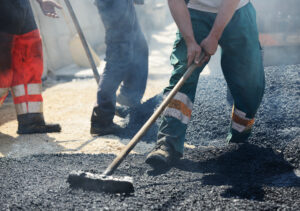 If you are injured on the job, Pennsylvania law requires that you immediately notify your employer. If your injury causes you to miss a unit of work a shift or a day then your employer must report your injury to the Pennsylvania Bureau of Workers Compensation. The initial decision about awarding benefits is decided by the employer, who may deny your claim. If so, you will need to attend a hearing and let a judge decide. Your employer will certainly be represented by a lawyer at that hearing. You should be as well.
There are additional scenarios where your case may end up in front of a judge. For instance, if you are unable to work, your employer may find and offer you a job that is not precluded by your injuries. If you refuse this offer, your employer may demand a hearing to end your benefits, and you will need to argue why they should be continued. The worker compensation insurance company also may attempt to terminate your compensation by alleging you have made a full recovery, even if you have not fully recovered.
If you are injured on the job, Pennsylvania law requires that you immediately notify your employer. If your injury causes you to miss a unit of work a shift or a day then your employer must report your injury to the Pennsylvania Bureau of Workers Compensation. The initial decision about awarding benefits is decided by the employer, who may deny your claim. If so, you will need to attend a hearing and let a judge decide. Your employer will certainly be represented by a lawyer at that hearing. You should be as well.
There are additional scenarios where your case may end up in front of a judge. For instance, if you are unable to work, your employer may find and offer you a job that is not precluded by your injuries. If you refuse this offer, your employer may demand a hearing to end your benefits, and you will need to argue why they should be continued. The worker compensation insurance company also may attempt to terminate your compensation by alleging you have made a full recovery, even if you have not fully recovered.
Costs Involved With Common Workplace Injuries
For a worker, the personal and financial costs associated with a workplace injury can be significant. The financial costs of an injury may include medical bills and also the days, weeks or months that a worker must take off of work to seek treatment for and heal from his or her injuries. The financial costs of even seemingly minor types of work injuries can quickly add up as old injuries may later become aggravated and lead to even more serious injuries and financially burdens. While the actual monetary costs of a workplace injury can be accounted for by keeping track of doctor’s bills and lost wages, personal costs are often more difficult to quantify. Pain and complications associated with a workplace injury may not only result in a worker missing work, but also missing out on the rest of life too. A workplace injury can make it difficult to impossible to clean and maintain a home, participate in enjoyable activities and play with children or grandchildren. In short, a workplace injury can negatively impact a worker’s happiness and overall quality of life issue.What To Do After a Workplace Injury
For workers who are injured while performing job-related duties, it’s important to report an injury to an employer as soon as possible and to see a doctor to obtain a formal diagnosis and treatment plan. Additionally, it’s wise to consult with an attorney who understands the workers’ compensation claims process and who can answer questions and advocate on one’s behalf. Not only is the workers’ compensation claims process confusing, but some employers fail to take the situation serious and may be more worried about their own bottom lines. Additionally, insurance companies often deny valid claims for various reasons including assertions of missing paperwork and insufficient evidence of an injury. After suffering a workplace injury, a worker’s focus should be on recovery. To help ensure that an injured worker receives prompt and proper care and compensation for a workplace injury, an attorney can assist in the initial filing of a worker’s compensation claim as well as advocate on a worker’s behalf when communicating with an employer and insurance provider.How injured road crew workers can collect more compensation
Warmer weather is here, which means two things for our local roads and highways here in the Lancaster area: There will be more construction crews and drivers – locals and people just passing through Pennsylvania – out there. If you work on a road construction crew – setting up cones, fixing potholes, shoveling pavement, directing traffic, etc. – you are no doubt on the lookout for oncoming traffic. Unfortunately, the drivers out there do not always do the same. There is little to protect road workers from negligent drivers, meaning when a collision happens, their injuries are often quite serious. What you may not know is that you may be able to recover additional compensation for your injuries beyond your workers’ compensation benefits.
What is a third-party lawsuit?
In Pennsylvania, workers who are hurt on the job are entitled to workers’ compensation benefits that can help cover the cost of medical care and lost wages after you are hurt on the job. Your employer does not have to be directly responsible for your injuries; if you are hurt while in the course of performing your job, you qualify.
If a negligent driver hits you while you are working road construction, since that driver is not a part of your company, you could also file a personal injury lawsuit against that driver for additional damages. This is a third-party liability claim, because the driver was an outside party who hurt you while you were on the job.
Get the compensation you deserve
Under Pennsylvania law, you cannot recover pain and suffering compensation from your employer, and your workers’ comp. benefits will likely not cover 100 percent of your lost wages. That is why you can file the third-party claim against the negligent driver. If you are seriously hurt, that extra compensation can mean all the difference in your recovery and your family’s ability to make ends meet.
What to look out for
As the summer driving season kicks into high gear, it’s important to be on the lookout for negligent and reckless driving. The speed zone will likely be reduced in your work zone, but not all drivers obey the signs. Additionally, many also wait too long to change lanes and drive too close to workers. Even if traffic is moving slowly in your work zone, distracted driving still puts workers like you at risk as well.
No one heads to work in the morning thinking they will be the victim of a workplace accident or suffer job-related injuries. However, every year millions of workers throughout the U.S. suffer painful injuries at work that result in significant personal and financial losses.
If you work on a road construction crew – setting up cones, fixing potholes, shoveling pavement, directing traffic, etc. – you are no doubt on the lookout for oncoming traffic. Unfortunately, the drivers out there do not always do the same. There is little to protect road workers from negligent drivers, meaning when a collision happens, their injuries are often quite serious. What you may not know is that you may be able to recover additional compensation for your injuries beyond your workers’ compensation benefits.
What is a third-party lawsuit?
In Pennsylvania, workers who are hurt on the job are entitled to workers’ compensation benefits that can help cover the cost of medical care and lost wages after you are hurt on the job. Your employer does not have to be directly responsible for your injuries; if you are hurt while in the course of performing your job, you qualify.
If a negligent driver hits you while you are working road construction, since that driver is not a part of your company, you could also file a personal injury lawsuit against that driver for additional damages. This is a third-party liability claim, because the driver was an outside party who hurt you while you were on the job.
Get the compensation you deserve
Under Pennsylvania law, you cannot recover pain and suffering compensation from your employer, and your workers’ comp. benefits will likely not cover 100 percent of your lost wages. That is why you can file the third-party claim against the negligent driver. If you are seriously hurt, that extra compensation can mean all the difference in your recovery and your family’s ability to make ends meet.
What to look out for
As the summer driving season kicks into high gear, it’s important to be on the lookout for negligent and reckless driving. The speed zone will likely be reduced in your work zone, but not all drivers obey the signs. Additionally, many also wait too long to change lanes and drive too close to workers. Even if traffic is moving slowly in your work zone, distracted driving still puts workers like you at risk as well.
No one heads to work in the morning thinking they will be the victim of a workplace accident or suffer job-related injuries. However, every year millions of workers throughout the U.S. suffer painful injuries at work that result in significant personal and financial losses.
 According to national statistics, here are the top five most common workplace injuries:
1) Overexertion Injuries – Workers suffer more injuries as a result of attempting to lift, push, pull, carry and throw objects at work than from any other type of activity, accounting for $13.6 billion in workers’ compensation benefits.
2) Slips and Falls – From a fall down a workplace staircase to a slip on a freshly mopped office floor, injuries resulting from slips and falls are the second most-common types of injuries suffered by U.S. workers.
3) Falls From Heights – Especially common among construction workers; a fall from a ladder or off of a roof can result in a worker suffering serious and debilitating injuries including broken bones, traumatic brain injuries and internal bleeding.
4) Reaction Injuries – Often suffered in the wake of a slip or trip accident that does not result in a fall, reaction injuries frequently result in injuries to muscles and soft tissue that are painful and slow to heal.
5) Struck by a Falling Object – Workers who are employed at warehouses and construction sites are especially at risk of being struck by falling objects. These types of accidents often result in traumatic brain injuries which cause permanent and life-altering damage.
According to 2014 statistics, workplace-related injuries resulted in U.S. workers missing more than 1.1 million days of work. If you suffer a workplace injury and are unable to work, you’re likely to have many questions and concerns about your health and financial security.
According to national statistics, here are the top five most common workplace injuries:
1) Overexertion Injuries – Workers suffer more injuries as a result of attempting to lift, push, pull, carry and throw objects at work than from any other type of activity, accounting for $13.6 billion in workers’ compensation benefits.
2) Slips and Falls – From a fall down a workplace staircase to a slip on a freshly mopped office floor, injuries resulting from slips and falls are the second most-common types of injuries suffered by U.S. workers.
3) Falls From Heights – Especially common among construction workers; a fall from a ladder or off of a roof can result in a worker suffering serious and debilitating injuries including broken bones, traumatic brain injuries and internal bleeding.
4) Reaction Injuries – Often suffered in the wake of a slip or trip accident that does not result in a fall, reaction injuries frequently result in injuries to muscles and soft tissue that are painful and slow to heal.
5) Struck by a Falling Object – Workers who are employed at warehouses and construction sites are especially at risk of being struck by falling objects. These types of accidents often result in traumatic brain injuries which cause permanent and life-altering damage.
According to 2014 statistics, workplace-related injuries resulted in U.S. workers missing more than 1.1 million days of work. If you suffer a workplace injury and are unable to work, you’re likely to have many questions and concerns about your health and financial security.
Injured Workers Can Apply For Workers’ Compensation Benefits
Fortunately, workers’ compensation benefits exist to provide financial assistance to workers who suffer injuries while performing job-related tasks. Unfortunately, the workers’ compensation system is complex and many people experience difficulty and frustration when attempting to secure benefits. An attorney who handles workers’ compensation matters can assist with the initial application process and, if your claim was denied, with the appeals process.Top 10 Most Dangerous Jobs in Pennsylvania for 2013: Its Not Who You Might Think
We may all feel as if work is going to destroy us at times, but for people in the professional vocations represented below, the reality may be truly disconcerting. Any job can come with a risk to your health and well-being; however, the following 10 vocations had the highest percentage of injuries per 1,000 workers in 2013: Public Administration: 35.7 injuries per 1,000 workers. It may come as a surprise that Public Administration, including governmental positions may be the most prone to injuries; however, this sector also encompasses firefighters and police activities. The first responders are the heroes who put their lives on the line every day and are unfortunately subject to the highest probability of injury. Outside of first responders, governmental workers encompass a large portion of this sector and report a high amount of overexertion injuries. These overexertion injuries are often seen in a typical office setting when duties are performed outside of the normal office job tasks.
Public Administration: 35.7 injuries per 1,000 workers. It may come as a surprise that Public Administration, including governmental positions may be the most prone to injuries; however, this sector also encompasses firefighters and police activities. The first responders are the heroes who put their lives on the line every day and are unfortunately subject to the highest probability of injury. Outside of first responders, governmental workers encompass a large portion of this sector and report a high amount of overexertion injuries. These overexertion injuries are often seen in a typical office setting when duties are performed outside of the normal office job tasks.- Agriculture: 34.7 injuries per 1,000 workers. Working in the agriculture field requires a worker to face dangers related to both crop production and animal production. These hard working individuals are exposed to elements both natural and man-made. Chemicals, heat, and heavy machinery are among the top reasons for injury or death for agriculture workers.
- Construction: 34.0 injuries per 1,000 workers. Roofing, steel work, or simple siding project, work in the construction field is highly dangerous. Two of the top hazards of the construction trade are falls from great heights and being struck by an object, causing injury.
- Mining: 28.0 injuries per 1,000 workers. Working underground and/or with mining equipment carries its own risks, but add to that the tools of the trade and these workers can be subject to extreme danger of injury and death. The mining profession carries with it the risk of death and injury by cave-ins, explosives, and electrocution.
- Manufacturing: 24.7 injuries per 1,000 workers. This sector includes all facets of manufacturing from assembly to completion of products. Assembly line workers must always use best practices to avoid falling victim to any number of possible mechanisms of injury. Assembly workers typically utilize implements including knives and heavy duty machinery which result in the highest number of amputations in the Commonwealth of Pennsylvania.
- Trade, Transportation and Utilities: 21.0 injuries per 1,000 workers. Utility workers typically work in and around very dangerous substances; however, falls from a high elevation is a noted substantial risk to these workers, as shown by the data. Whether it is an injury while working on a natural gas line, downed electrical wires or installation of a home theater system, this sectors workers reported the highest number of injuries as a result of a fall from an elevation within the Commonwealth in 2013.
- Education and Health Services: 20.6 injuries per 1,000 workers. Teaching can be a very rewarding job; however, it is also extremely dangerous. This sector of employment reported the most total injuries in the Commonwealth in 2013. Unfortunately, student on teacher violence continues as this sector also reported the highest instances of an injured worker being struck as the primary component of their work injury.
- Leisure and Hospitality: 14.2 injuries per 1,000 workers. Hotel and restaurant workers make up the vast majority of the injuries that result from this sector. Given the nature of the work performed at a restaurant, it should be no surprise that cut, laceration and puncture wounds are a very high portion of the reported claims within this sector.
- Information: 12.4 injuries per 1,000 workers. This may be a surprising sector to fall within this list of dangerous occupational sectors; however, this sector is inclusive of not only IT services but publishing industries and telecommunication industries. Publication companies work with large assembly line type equipment for binding purposes which can result in crush, amputation and repetitive stress injuries. Telecommunication workers may be exposed to high voltage power lines as well as heights in the course and scope of their job.
- Professional & Business Services: 10.6 injuries per 1,000 workers. Rounding out the Top 10 are professionals. As one would expect, there are very few traumatic injuries resulting from professional services; however, this sector also encompasses waste services including trash pickup and landfill maintenance. These workers are constantly exposed to unknown substances and are required to constantly lift up to 100 pounds on a daily basis, resulting in a high percentage of back and shoulder injuries.
OSHA: Finger injuries among most common in Pennsylvania
Workplace injuries can happen in any occupation, even serious ones. According to recent data made available by the U.S. Occupational Safety and Health Administration (OSHA), when it comes to “severe” injuries, Pennsylvania workers are most at risk of serious finger injuries. For the purposes of this data, OSHA, the federal workplace safety agency, defines a “severe injury” as an amputation, loss of an eye or an injury requiring hospitalization. In 2015 and 2016, employers across Pennsylvania reported a total of 1,595 severe injuries. Of those, 28 percent involved injuries to or the loss of fingers and fingernails.
This information makes sense when you consider that almost every single line of work involves working with your hands in some way. Even if you work in an office, a freak accident could occur. Some of the occupations that people work in here in the Lancaster area where they would be more likely to suffer a severe finger injury or a finger amputation include:
For the purposes of this data, OSHA, the federal workplace safety agency, defines a “severe injury” as an amputation, loss of an eye or an injury requiring hospitalization. In 2015 and 2016, employers across Pennsylvania reported a total of 1,595 severe injuries. Of those, 28 percent involved injuries to or the loss of fingers and fingernails.
This information makes sense when you consider that almost every single line of work involves working with your hands in some way. Even if you work in an office, a freak accident could occur. Some of the occupations that people work in here in the Lancaster area where they would be more likely to suffer a severe finger injury or a finger amputation include:
- Food service or preparation, especially when the use of knives or an electric slicer is necessary
- Construction work that involves the use of power tools
- Manufacturing work involving large machines
- Mining, fracking and other energy-related work
- Nurses who are working around needles and having to lift patients
- Loading cargo onto semi-trucks
 Kitchen burns can occur for various reasons, but some common culprits stand out, especially for kitchen workers:
Hot Surfaces: Kitchen workers frequently come into contact with scorching hot countertops, stovetops, and oven doors during their daily tasks.
Splattering Hot Liquids: The sizzle of a frying pan and the bubbling of a pot can create splatters that release scalding liquids, posing a significant risk to kitchen workers.
Steam: Steam escaping from boiling pots or containers can cause steam burns, which are often underestimated but can be equally harmful to kitchen workers.
Microwave Mishaps: Microwave ovens can heat food unevenly, leading to unexpected bursts of hot steam when the door is opened, putting kitchen workers at risk.
Grease Fires: Traditional frying methods in Lancaster County can sometimes lead to grease fires, which not only cause burns but can escalate into more extensive kitchen fires.
Support and Safety Measures for Kitchen Workers:
Kitchen workers deserve a safe working environment. Here are some safety measures that can help prevent kitchen burns and provide support if an accident occurs:
Training and Awareness: Employers should provide comprehensive safety training to kitchen workers, emphasizing the importance of staying alert and focused while working in a busy kitchen.
Protective Gear: Kitchen workers should always use appropriate protective gear like oven mitts, aprons, and gloves to handle hot objects safely.
Safe Workspaces: Employers should ensure that kitchen workspaces are designed with safety in mind, including the use of splatter guards and deep fryers when necessary.
First Aid: Kitchen workplaces should have a well-stocked first aid kit readily available, and workers should be trained in basic first aid for burns and other injuries.
Legal Support: If a kitchen worker experiences a burn injury in Lancaster County, legal professionals experienced in workers’ compensation cases, like McDonald At Law, can provide crucial support.
How McDonald At Law Can Help Kitchen Workers:
Accidents can happen unexpectedly, even in the kitchen. If you’re a kitchen worker who has suffered a burn injury in Lancaster County, McDonald At Law is here to offer comprehensive legal support tailored to your needs:
Compassionate Understanding: We understand the physical, emotional, and financial challenges that a kitchen burn accident can bring, and we provide compassionate legal counsel that considers your well-being.
Legal Experience: Our firm focuses on personal injury cases, including burn injuries, and we have a successful track record of handling such cases in Lancaster County.
Investigation and Documentation: Our experienced legal team will conduct a thorough investigation, gather evidence, and document every aspect of your case to build a strong claim.
Negotiation and Advocacy: We will negotiate with insurance companies and opposing parties to secure a fair settlement that covers your medical expenses, pain, suffering, and other damages.
Trial-Ready Representation: If necessary, we are prepared to take your case to trial to ensure your rights are protected.
Maximizing Compensation: We work to ensure you receive compensation not only for immediate expenses but also for future medical treatments or lifestyle adjustments necessitated by your injuries.
Kitchen workers in Lancaster County play a vital role in our culinary traditions, and their safety should be a top priority. If you or a loved one has suffered a kitchen burn accident, McDonald At Law is here to offer unwavering support, legal experience, and a commitment to justice. Your journey to compensation and recovery begins with McDonald At Law, where we’re dedicated to helping kitchen workers in workers’ compensation cases after kitchen burns.
We understand that recovering from a kitchen burn accident can be a challenging and emotional journey. Our commitment extends beyond legal representation; we’re here to provide you with peace of mind, support, and the assurance that you’re not alone in your pursuit of justice.
Kitchen workers in Lancaster County deserve to have their rights protected and to receive the compensation they need to move forward with their lives. At McDonald At Law, we are ready to fight for your rights and help you secure the support you deserve. Your journey to justice begins with us.
Your safety and well-being are of utmost importance, and we will work tirelessly to ensure that you receive the compensation and support necessary for your recovery. Contact McDonald At Law today to schedule a consultation and take the first step towards securing the justice and compensation you deserve after a kitchen burn accident. Remember, you don’t have to go through this journey alone; we’re here to stand by your side every step of the way.
Kitchen burns can occur for various reasons, but some common culprits stand out, especially for kitchen workers:
Hot Surfaces: Kitchen workers frequently come into contact with scorching hot countertops, stovetops, and oven doors during their daily tasks.
Splattering Hot Liquids: The sizzle of a frying pan and the bubbling of a pot can create splatters that release scalding liquids, posing a significant risk to kitchen workers.
Steam: Steam escaping from boiling pots or containers can cause steam burns, which are often underestimated but can be equally harmful to kitchen workers.
Microwave Mishaps: Microwave ovens can heat food unevenly, leading to unexpected bursts of hot steam when the door is opened, putting kitchen workers at risk.
Grease Fires: Traditional frying methods in Lancaster County can sometimes lead to grease fires, which not only cause burns but can escalate into more extensive kitchen fires.
Support and Safety Measures for Kitchen Workers:
Kitchen workers deserve a safe working environment. Here are some safety measures that can help prevent kitchen burns and provide support if an accident occurs:
Training and Awareness: Employers should provide comprehensive safety training to kitchen workers, emphasizing the importance of staying alert and focused while working in a busy kitchen.
Protective Gear: Kitchen workers should always use appropriate protective gear like oven mitts, aprons, and gloves to handle hot objects safely.
Safe Workspaces: Employers should ensure that kitchen workspaces are designed with safety in mind, including the use of splatter guards and deep fryers when necessary.
First Aid: Kitchen workplaces should have a well-stocked first aid kit readily available, and workers should be trained in basic first aid for burns and other injuries.
Legal Support: If a kitchen worker experiences a burn injury in Lancaster County, legal professionals experienced in workers’ compensation cases, like McDonald At Law, can provide crucial support.
How McDonald At Law Can Help Kitchen Workers:
Accidents can happen unexpectedly, even in the kitchen. If you’re a kitchen worker who has suffered a burn injury in Lancaster County, McDonald At Law is here to offer comprehensive legal support tailored to your needs:
Compassionate Understanding: We understand the physical, emotional, and financial challenges that a kitchen burn accident can bring, and we provide compassionate legal counsel that considers your well-being.
Legal Experience: Our firm focuses on personal injury cases, including burn injuries, and we have a successful track record of handling such cases in Lancaster County.
Investigation and Documentation: Our experienced legal team will conduct a thorough investigation, gather evidence, and document every aspect of your case to build a strong claim.
Negotiation and Advocacy: We will negotiate with insurance companies and opposing parties to secure a fair settlement that covers your medical expenses, pain, suffering, and other damages.
Trial-Ready Representation: If necessary, we are prepared to take your case to trial to ensure your rights are protected.
Maximizing Compensation: We work to ensure you receive compensation not only for immediate expenses but also for future medical treatments or lifestyle adjustments necessitated by your injuries.
Kitchen workers in Lancaster County play a vital role in our culinary traditions, and their safety should be a top priority. If you or a loved one has suffered a kitchen burn accident, McDonald At Law is here to offer unwavering support, legal experience, and a commitment to justice. Your journey to compensation and recovery begins with McDonald At Law, where we’re dedicated to helping kitchen workers in workers’ compensation cases after kitchen burns.
We understand that recovering from a kitchen burn accident can be a challenging and emotional journey. Our commitment extends beyond legal representation; we’re here to provide you with peace of mind, support, and the assurance that you’re not alone in your pursuit of justice.
Kitchen workers in Lancaster County deserve to have their rights protected and to receive the compensation they need to move forward with their lives. At McDonald At Law, we are ready to fight for your rights and help you secure the support you deserve. Your journey to justice begins with us.
Your safety and well-being are of utmost importance, and we will work tirelessly to ensure that you receive the compensation and support necessary for your recovery. Contact McDonald At Law today to schedule a consultation and take the first step towards securing the justice and compensation you deserve after a kitchen burn accident. Remember, you don’t have to go through this journey alone; we’re here to stand by your side every step of the way.
Must You Treat With A Company Doctor After A Work Injury?
The medical treatment received within first 90 days after a legitimate work injury are the most critical. In Pennsylvania, most employers require an injured worker to treat with a panel occupational medicine provider for the first 90 days after a work injury is reported. (A panel physician is a list of physicians that your employer must post in your workplace and you may be require to treat with for the first 90 days after your accident). However, what many injured workers do not realize is: they may be able to treat with a doctor of their own choice for those first 90 days, if their employer does not follow the law. Typically a panel physician provider has a pre-existing relationship with the employer and/or insurance carrier. While the employer is not legally permitted to control your medical care, the ultimate opinions of these company physicians may be directed/influenced by the employer, possibly requiring you to return to work before you are physically capable. Returning to work before you are physically capable may put you at risk for additional further injury as well as turning a temporary injury into a permanent one.
Employers often threaten injured workers to not pay for medical treatment for the first 90 days unless they treat with one of the panel occupational medicine providers. While an employer may be able to avoid payment of medical treatment, under certain circumstances, there are opportunities for savvy injured workers to seek treatment with their own physician and have that care paid for by the employer within the first 90 days after an accepted work related injury.
An employer must provide injured workers with a list of the panel providers of the company either through posting them in the workplace and/or providing them to the injured worker at the time of the injury.
The regulation that requires injured workers to treat with the panel physician also requires employers to provide injured workers with a Notice of Rights and Duties as soon as possible after the injury. If they fail to provide this Notice as well as provide a list of panel physicians, the Employer forfeits the requirement for you to treat with the panel physician. What this means is that your employer must provide the required Notice to you shortly after you report a work injury. If your employer fails to provide you with a Notice of Rights and Duties for a work injury, you may have the choice to treat at a provider, of your choice, within those critical first 90 days after your injury. If the employer accepts responsibility for the injury, and has failed to provide a timely Notice of Rights and Duties, they cannot avoid payment of the treatment with the physician of your choice unless that treatment is unrelated to your work injury.
Be aware that if an employer has posted a list of panel doctors and provides you with a timely Notice of Rights and Duties and you do not treat with the panel medical provider for the first 90 days, payment for that treatment can legally be refused by the employer. That cost will then be borne by you.
At the expiration of 90 days after the report of a work injury, the law allows you to treat with any physician of your choosing.
Remember, if you are injured at work, Pennsylvania law requires you to notify your employer as soon as possible. If you are unsure whether you have been provided with the proper Notice of Rights and Duties, call us today.
Let the attorneys at McDonald At Law assist you through the complex Pennsylvania workers compensation system.
Typically a panel physician provider has a pre-existing relationship with the employer and/or insurance carrier. While the employer is not legally permitted to control your medical care, the ultimate opinions of these company physicians may be directed/influenced by the employer, possibly requiring you to return to work before you are physically capable. Returning to work before you are physically capable may put you at risk for additional further injury as well as turning a temporary injury into a permanent one.
Employers often threaten injured workers to not pay for medical treatment for the first 90 days unless they treat with one of the panel occupational medicine providers. While an employer may be able to avoid payment of medical treatment, under certain circumstances, there are opportunities for savvy injured workers to seek treatment with their own physician and have that care paid for by the employer within the first 90 days after an accepted work related injury.
An employer must provide injured workers with a list of the panel providers of the company either through posting them in the workplace and/or providing them to the injured worker at the time of the injury.
The regulation that requires injured workers to treat with the panel physician also requires employers to provide injured workers with a Notice of Rights and Duties as soon as possible after the injury. If they fail to provide this Notice as well as provide a list of panel physicians, the Employer forfeits the requirement for you to treat with the panel physician. What this means is that your employer must provide the required Notice to you shortly after you report a work injury. If your employer fails to provide you with a Notice of Rights and Duties for a work injury, you may have the choice to treat at a provider, of your choice, within those critical first 90 days after your injury. If the employer accepts responsibility for the injury, and has failed to provide a timely Notice of Rights and Duties, they cannot avoid payment of the treatment with the physician of your choice unless that treatment is unrelated to your work injury.
Be aware that if an employer has posted a list of panel doctors and provides you with a timely Notice of Rights and Duties and you do not treat with the panel medical provider for the first 90 days, payment for that treatment can legally be refused by the employer. That cost will then be borne by you.
At the expiration of 90 days after the report of a work injury, the law allows you to treat with any physician of your choosing.
Remember, if you are injured at work, Pennsylvania law requires you to notify your employer as soon as possible. If you are unsure whether you have been provided with the proper Notice of Rights and Duties, call us today.
Let the attorneys at McDonald At Law assist you through the complex Pennsylvania workers compensation system.
How Long Does Workers’ Compensation Last in Pennsylvania?
Workers’ compensation serves as an essential safety net for employees who endure work-related injuries or illnesses, ensuring they receive medical benefits, wage loss compensation, and other forms of support. In Pennsylvania, where the structure of workers’ compensation is designed to offer comprehensive aid, understanding the duration of these benefits is vital for both employees and employers to manage expectations and plan ahead effectively. At the heart of workers’ compensation in Pennsylvania are the medical benefits, which cover the cost of treatment for work-related injuries or illnesses. These benefits are provided as long as necessary, given the treatment is reasonable and pertinent to the work injury. Although there is no set time limit, insurance companies may contest the duration or necessity of the treatment. Alongside medical benefits, wage loss benefits play a critical role, offering a portion of the employee’s wages if they are temporarily or permanently unable to work due to their injury or illness. Temporary Total Disability benefits support employees completely unable to work for up to 104 weeks, pending evaluation for maximum medical improvement. For those who can return to work but with reduced capacity, Permanent Partial Disability benefits are available, potentially extending up to 500 weeks, depending on the impairment severity and earning capacity. Furthermore, specific loss benefits provide compensation for the permanent loss or use of a body part, like a limb or hearing, with the duration predetermined by the Pennsylvania Workers’ Compensation Act. This specificity ensures that employees receive fair compensation for their losses. In the unfortunate event of a worker’s death due to work-related injuries or illnesses, death benefits offer financial support to the dependents, with the duration varying based on their age and relationship to the deceased. Workers’ compensation in Pennsylvania is structured to support employees through various benefits, catering to the needs arising from work-related injuries and illnesses. The duration of these benefits is designed to reflect the severity of the injury and the recovery path, ensuring that employees and their dependents receive adequate support during challenging times. Understanding these nuances is crucial for navigating the system effectively and securing the necessary support for affected workers.Back in 2014 I was injured didn’t know what to do but my wife suggested I call Mike McDonald at law I’m not going to say that I really believe in luck but I will say it was the greatest blessing of my entire life that I had the opportunity to pick the best lawyer in Pennsylvania and maybe all of America in Mike McDonald. I needed surgery and Mike came to my home just to make sure that I was OK personally, and he told me not to worry about anything but to just get well he really cares about people and that is something you can’t pay for. Mike’s firm was the most professional operation I have ever had the opportunity to witness over the last 3 1/2 years . All I can say is this if you’ve been injured and you need help there’s only one person that you should call and that’s McDonald at law. From my experience is that when I arrived at his office the first time I met a lawyer and when I left his office the last time I felt like I had a friend. For superior service and expert litigation, remember there’s only one number to call if you ever get hurt it’s McDonald at law.



